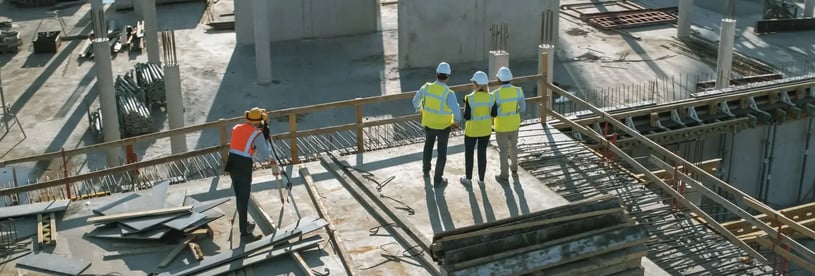Improving Project Timelines In Franchise Construction

Delays are a dime a dozen in construction projects. Some disruptions, such as weather, are beyond a manager’s control, but others, like supply issues, are—and the cost can quickly mount. One construction industry estimate states that delays can increase the project’s total cost by around one-fifth of the initial price.
The situation is more complicated in franchise construction, where the builder’s client is a franchise brand (think of McDonald’s or Starbucks). This client can be a stickler for design and construction rules to preserve the brand’s consistency. However, this means it must provide the build details themselves, which can potentially contribute to project delays.
Losses due to construction delays can snowball to the point of the whole project grinding to a halt. As such, it’s in a builder’s best interest to ensure a seamless timeline of activities for any construction endeavor, let alone one for a franchise company.
Automating Repetitive Tasks
Automation should come as no surprise to builders, as it has been doing that for millennia. It’s easy to associate automation with robotics and AI, but any technology that maximizes results for minimal human input counts as such. This includes the machines used to build engineering marvels thousands of years ago.
That said, practices that were efficient centuries ago aren’t necessarily efficient now. Take scheduling, for example; organizing tasks on paper used to be a timesaver, but the advent of the Internet and remote access warranted digital schedules. In this case, the latter has the advantage of alerting users of important reminders, as opposed to a mere sticky note.
That’s only one of many aspects of project management, all of which can certainly benefit from investing in new tools to automate certain tasks. Construction companies get their tech stacks and the necessary support from Concord managed IT services and such to streamline crucial work processes, which translates to time saved. Some of the construction tech widely used include cybersecurity suites and construction project management software.
Clear Communication
Miscommunication is a major culprit in projects getting delayed. An industry as dynamic as construction requires a construction company to keep in touch not just with their clients but also with their project teams and suppliers.
Imagine asking for PVC pipes when a typo in a document actually meant to say the building needs CPVC pipes. A difference of a single letter may not look much, but considering both are used in many projects, such a mistake can cost builders money and time.
A more egregious result of miscommunication is known as scope creep. In this case, the project suddenly expands in scope for any number of reasons, one likely example being clients wanting to outdo their competition. It may not be much of an issue in the planning phase, but it’s a major pain for builders when it happens when construction commences.
Ensuring clear communication entails a laundry list of improvements. Fielding the latest communication systems is one way of overcoming the barrier, but of greater importance involves laying out clear project requirements to all stakeholders. If changes are likely to be made in the future, have a change implementation plan in place.
Realistic Deadlines
Anyone who loves quoting “Rome wasn’t built in a day” should know this, not only in the metaphorical sense but also in the literal. History has shown that almost nothing good (emphasis on “almost,” as there are outliers) comes out of rushed construction projects.
Such projects mainly spur from setting unrealistic construction timelines. Going back to the section about clear communication, it’s the builder’s responsibility to explain to their client—franchise company or otherwise—the time required to complete each stage of the project. If necessary, the builder can push back against unreasonable demands.
Realistic deadlines also acknowledge factors beyond the project’s control, namely the weather. While no project manager has the power to change the weather at will, they can plan contingencies for it. This isn’t much of an issue for projects that use prefab modules, but they still need to account for it to an extent.
Decision-Making Chain of Command
Contrary to popular belief, at least among the general public, the client isn’t the only one calling the shots. Sure, they may dictate the project flow in franchise construction based on their strict guidelines. However, the nuts and bolts (no pun intended) of construction fall in the hands of others somewhere in this chain of command.
Construction projects contain plenty of moving parts, with each individual responsible for ensuring their parts are running. Here are some of them and what they decide on.
- Senior Project Manager – client interaction, operational management
- Project Manager – cost estimation, work scheduling, and coordination
- Architect – functionality and aesthetics of the project design
- Engineers – varies based on their field (e.g., electrical engineer for wiring)
- Administrator – progress tracking, management of pertinent documents
Maintaining the chain of command involves each leader focusing on making decisions in their respective areas of responsibility. Project managers can’t afford all of them to make the call in all aspects of the project, as it’s a good way to create conflicting orders on-site and push back the completion date by months.
Additionally, these leaders must also have competent team members to help them with the decision-making process. One study shows that a lack thereof causes delays in decisions, which causes the project to also get delayed.
Conclusion
Just because delays are all too familiar in construction efforts doesn’t mean they can’t be resolved. Project managers need only get a good grasp of the internal workings and ask themselves how they can be made more efficient. This is a good tip to work with, whether involved in franchise or general construction.

Ravindra Ambegaonkar
Ravindra, the Marketing Manager at NY Engineers, holds an MBA from Staffordshire University and has helped us grow as a leading MEP engineering firm in the USA
Join 15,000+ Fellow Architects and Contractors
Get expert engineering tips straight to your inbox. Subscribe to the NY Engineers Blog below.
